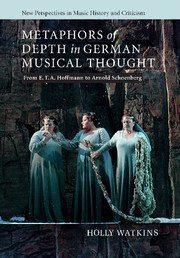Book contents
- Frontmatter
- Contents
- Music examples and figures
- Acknowledgements
- Note on the text
- Introduction
- 1 From the mine to the shrine
- 2 Adolf Bernhard Marx and the inner life of music
- 3 Robert Schumann and poetic depth
- 4 Richard Wagner and the depths of time
- 5 Heinrich Schenker and the apotheosis of musical depth
- 6 Schoenberg’s interior designs
- Notes
- Bibliography
- Index
3 - Robert Schumann and poetic depth
Published online by Cambridge University Press: 07 September 2011
- Frontmatter
- Contents
- Music examples and figures
- Acknowledgements
- Note on the text
- Introduction
- 1 From the mine to the shrine
- 2 Adolf Bernhard Marx and the inner life of music
- 3 Robert Schumann and poetic depth
- 4 Richard Wagner and the depths of time
- 5 Heinrich Schenker and the apotheosis of musical depth
- 6 Schoenberg’s interior designs
- Notes
- Bibliography
- Index
Summary
Monument to Romantic inscrutability or sly moment of self-exposure? Homage to secrets or just another mask at an already crowded ball? The “Sphinxes” of Robert Schumann’s Carnaval, op. 9, put on display three archaic-looking ciphers (E♭–C–B–A, A♭–C–B, A–E♭–C–B), mute orphans of a vague musical past (Example 3.1). Comprising the ninth “movement” in a set of twenty-two character pieces, the “Sphinxes” point toward meaning without connecting all the dots, solving some mysteries (the source of certain harmonic and motivic features of Carnaval) while creating others (what do the ciphers mean?). “These pages of Schumann may contain a secret,” Charles Rosen remarked in another context, “but they do not hide one.” In a curiously ambivalent form of musical depth, Schumann’s music wears concealment on its sleeve.
The preceding chapters of this book have dealt with the origins of depth as a critical and analytical concept rather than a compositional aim. In this chapter and the next, we turn to the writings and music of two critic-composers who loom large in the history of nineteenth-century music: Robert Schumann and Richard Wagner. Apart from his contributions to music criticism, Schumann’s inclusion in this study is justified by his reputation as the very embodiment of Romantic interiority, as the “musician of solitary intimacy,” in Roland Barthes’s memorable words. Studded with arcane titles, mottos, ciphers, “inner voices” (as in the Humoreske, op. 20), and allusions to literature and other musical works, Schumann’s scores come across as repositories of secrets, inviting interpretations which move from surface-level inscriptions to deeper meanings in need of reconstruction. Moreover, Schumann began his career composing music for “private rooms and the specially initiated,” notes Anthony Newcomb, and his reluctance to attempt a more public register of expression rankled his market-savvy fiancée Clara Wieck. Schumann’s inward-facing stance drew criticism as early as 1849, when Eduard Hanslick quipped that Schumann’s music was “too interior” and “too deep” to appeal to the masses. In a more philosophical vein, Franz Brendel, on taking the helm of the Neue Zeitschrift für Musik in 1854, branded Schumann the excessively subjective counterpart to the more objective Mendelssohn.
- Type
- Chapter
- Information
- Metaphors of Depth in German Musical ThoughtFrom E. T. A. Hoffmann to Arnold Schoenberg, pp. 86 - 118Publisher: Cambridge University PressPrint publication year: 2011

